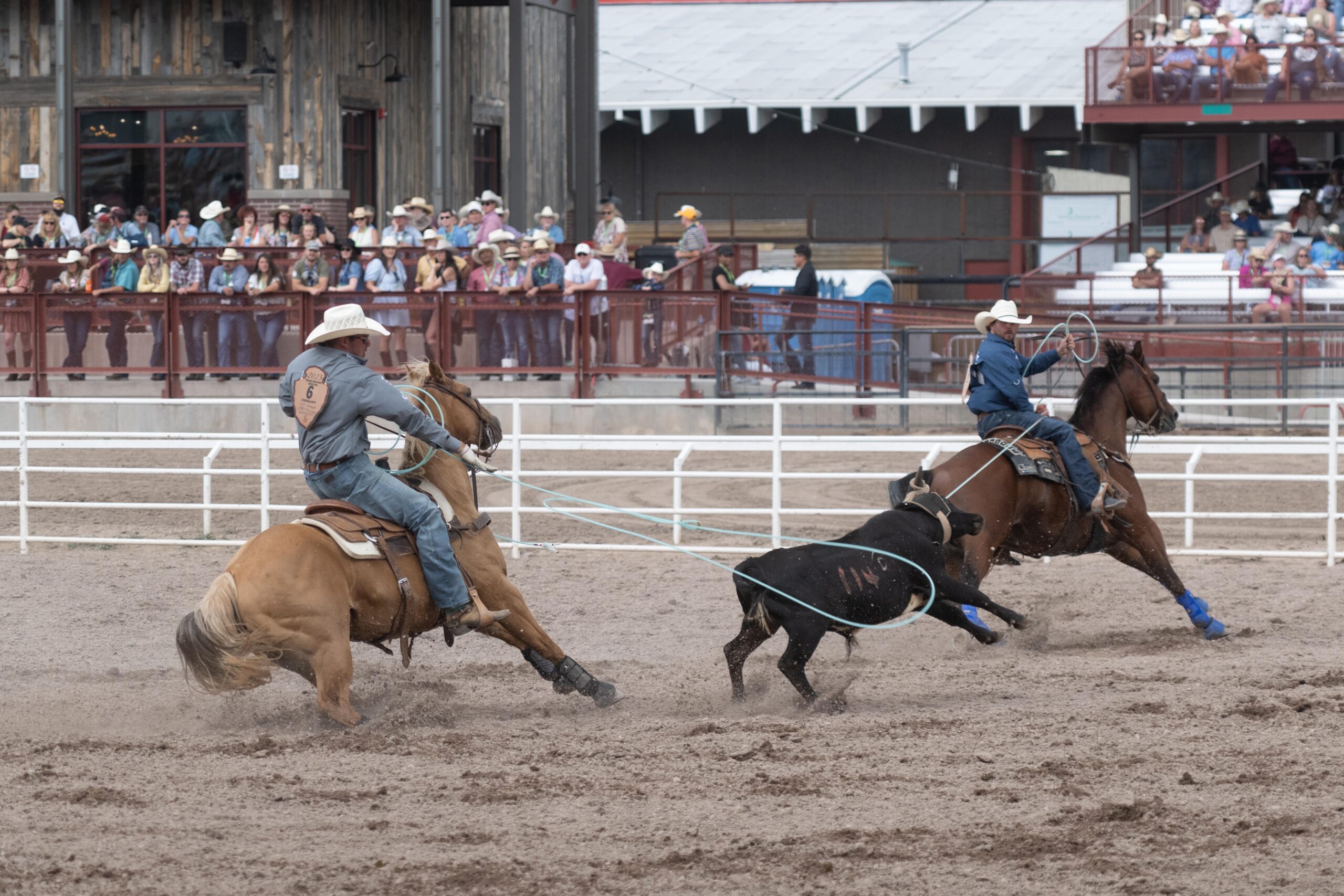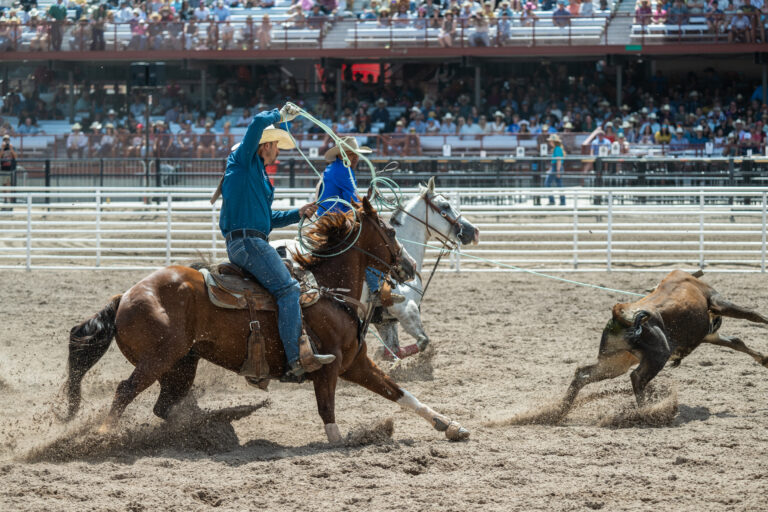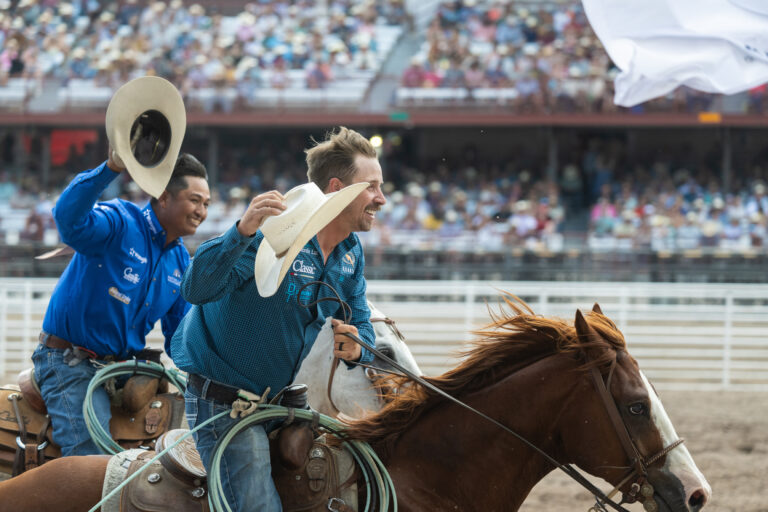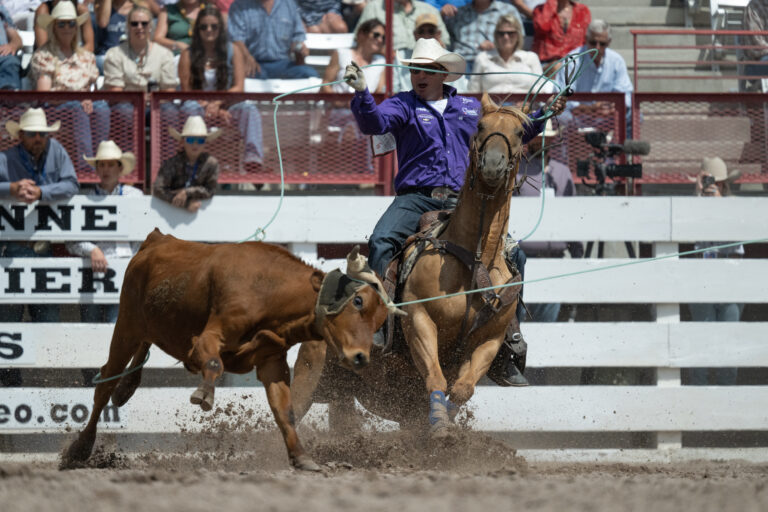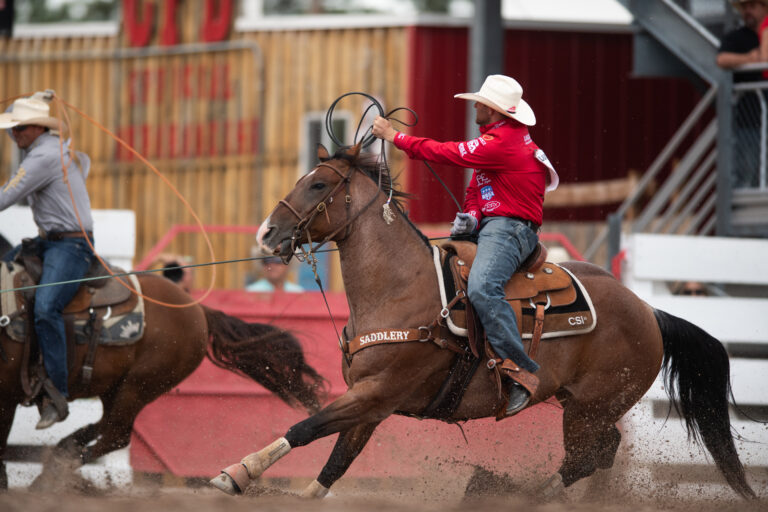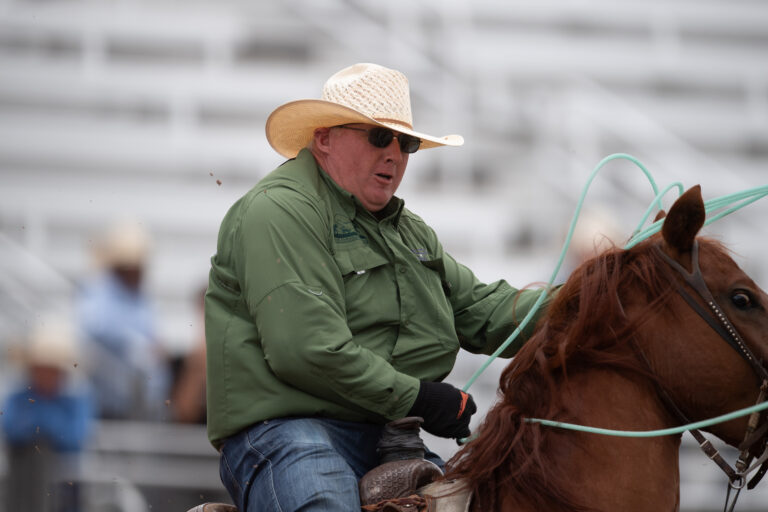Billy Bob Brown and Kirby Blankenship survived the gauntlet that is Cheyenne Frontier Days’ tournament-style format to win the coveted team roping title at the Daddy of ’em All, banking $10,600 each for the final round’s 8.0-second run and another $1,400 a man in round money.
Cheyenne, for all its history and lure, is perhaps the most significant regular-season win of any cowboy’s career, but for Brown and Blankenship, the iconic buckles, old-school trophy saddles and the victory lap around the beaches of Cheyenne was what their rodeo dreams are made of.
@teamropingjournal Billy Bob Brown and Kirby Blankenship took the Cheyenne Frontier Days championship home today thanks to this 8.0-second run. Results and story to follow at www.TeamRopingJournal.com, thanks to @resistol1927 #TeamRoping #Cowboy #ProRodeo #CheyenneFrontierDays ♬ Tick Tick Boom (feat. BygTwo3) – Sage The Gemini
“There’s people who will never be able to say they won this,” Blankenship said. “Great people. Great ropers. And for this to be my second time to come here, that’s pretty special.”
Brown, 31—a College National Finals champ twice in the heading with Logan Medlin and once in the all-around—has skirted the top 15 since winning the Resistol Rookie of the Year title in 2014. Yet to make the Big Show, he went home to Carbon, Texas, to regroup and rebuild horsepower before setting out again.
Blankenship, 24, of Lampasas, Texas, was set on making a living training rope horses and had a herd of outside horses when Brown called him early this summer, asking if he wanted to try out a month or so on the trail to try to get into the winter rodeos.
All Cheyenne Qualifying-Round, Quarterfinal and Semifinal Results
With nearly $45,000 won on the year (as a rough estimate, since the world standings are still down thanks to the PROCOM Ransomware hack), Brown and Blankenship should get into most of the winter rodeos. But the Cheyenne win meant a lot more to them than just an easy-in. Winning the Daddy is the ultimate cowboy cred—a checked box at the very top of the list of a rodeo cowboys’ goals.
Play-By-Play
Brown and Blankenship made a middle-of-the-pack 9.1-second run to make it back in the top 60 to the performances in the July 16 qualifier, and they followed that up by sneaking into the semifinals out of performance four in last hole with a 9.6-second run, worth $500. In the first semifinals on Friday, July 28, they sweated it out to hang onto the last hole there, too, with a 9.8.
Luckily, they saved their best for the clean-slate finals on championship Sunday at Cheyenne. They drew the same steer they’d run in Friday’s semifinals.
“We thought he was one of the on the better end of them if I got a good go like I did the other day,” Brown said. “But then he kind of threw a dip and twirl on us, a little left and right. The main thing to me was stick and kind of step ahead. But when I was stuck and he stepped back to the right, it kind of scared me cause I hit him harder than I wanted to, but it ended up working out.”
But Brown got him headed, and Blankenship picked up a bonus leg—Blankenship’s words, not ours—to put the pressure on the next five teams to out-blast their 8.0-second run.
Reigning world champs Kaleb Driggers and Junior Nogueira were up next, and they drew on the stronger end of the set but still smoked an 8.2-second run—a time that would win them their fourth and third Cheyenne Reserve Championship titles.
Curry Kirchner and Billie Jack Saebens had tough luck, and Andrew Ward and Buddy Hawkins were 14.6. The Mountain States’ team of Clayton VanAken and Cullen Teller came tight in 9.5, and Erich Rogers and Paul Eaves—who’d been dominant throughout the week—didn’t connect.
Brown, for his part, didn’t watch the rest of the teams go.
“I was so freaking nervous,” Brown said, shaking his head. “I turned and walked off because I couldn’t watch. I was standing with Driggers after he roped, and I told him, ‘You might have to pick me up. I might pass out.’ And he said, ‘Sure, no you won’t.’ But to me, this is a big deal.”
Added Significance

Brown’s dad, Kris, and mom, D’aun, came from Carbon, Texas, when Brown made the semifinals.
“In all my years rodeoing, my dad’s never came to Cheyenne to watch, and he said, if you make the semifinals, I’ll come out,” Brown said. and then we advanced and then it was just kind of a surreal moment, I guess, you know, because family is the biggest thing in my life. We’ve all lived by each other my whole life. The only time we spent apart was me going to college 45 minutes away.”
For Blankenship, the win was a confirmation that his leap of faith was all worth it. Brown had called him a day before books opened for the major July rodeos to see if he wanted to send his outside training horses home for a month and go rodeo.
“I was on the way home from Mount Pleasant, and Billy Bob called me and said, ‘Hey, uh, do you want to go rodeo?’ I was like, ‘Yeah, I, I would like that.’ And he’s like, ‘Well, I need to know tomorrow.’ So I was like, let’s just do it,” Blankenship said. “He talked me into it, but I’m so glad I got to come because I mean, in the back of my mind, I really wanted to do it. I just didn’t want anybody to be mad at me for, you know, the spend money on me and the outside horses and the time, but at the end of the day, I think it actually helps it all, too. It makes me sharper.”
Horsepower
For Brown, the win was that much more special because of the team of horses they won it on. He and his family own both the head and heel horse.
Find Out How All 24 Cheyenne Short Round Rope Horses Are Bred
Head Horse: Going Where Its Hot
Going Where Its Hot—who Brown calls Little Bay, very originally—is a sibling to the horse he started his career on that came from Trevor Brazile. Brown lost that horse unexpectedly, sidelining his rodeo career at the time.
“When I lost him, the people who had Starlight Gypsy let me go out into their pasture and pick a 2-year-old,” Brown explained. “He’s the first one I really fully trained all the way. And I’m not really that much of a horse trainer, so it’s pretty special to me to get on a big stage and have a good win with him.”

Heel Horse: Mr Spanish Ray
The palomino gelding Blankenship rode is a 6-year-old that Brown’s dad rides to flag on at all of their ropings.
“He’s fast, he’s free, he’s easy,” Blankenship said. “I mean, you can’t really ask for a better horse, and, I appreciate them letting me ride him. I thought it might take me a little bit longer to get in time to throw on my other horse. So after I rode ‘Trigger’ the first day, I told Kris I was staying on him.”

Next Up
With the goal of getting into the winter rodeos, Brown and Blankenship are staying hooked for the time being at the ProRodeos. But the duo also knows where the money’s at: in 2022, they each banked BIG checks at the November Riata Buckle Futurity, placing together in the Open with Blankenship heading to win the #12.5 All-Ages, too. So before long, they’ll be home tuning up futurity horses.
“I wish they had 15 Riata Buckles for us to go to all year,” Blankenship laughed. “Now people know how good they are, and we have quite a few who want to go to it. I want to have them prepared and, you know, just be ready to go, be ready to win there because that was such a good deal.” TRJ
Cheyenne Frontier Days Team Roping Average Results:
1, Billy Bob Brown, Carbon, Texas, and Kirby Blankenship, Lampasas, Texas, 8.0 seconds, $9,200. 2, Kaleb Driggers, Hoboken, Ga., and Junior Nogueira, Presidente Prude, Brazil, 8.2, $8,000. 3, Bubba Buckaloo, Kingston, Okla., and J.R. Gonzales, Maypearl, Texas, 9.0, $6,800. 4, Clayton Van Aken, Yoder, Wyo., and Cullen Teller, Ault, Colo., 9.5, $5,600. 5, Edgar Aguilar, Greeley, Colo., Edgar Villegas, Denver, Colo., 10.6, $4,400. 6. Jr. Dees, Aurora, S.D., and Ross Ashford, Lott, Texas; Billy Bob Brown, Carbon, Texas, 13.2, $3,200. 7, Andrew Ward, Edmond, Okla., and Buddy Hawkins II, Stephenville, Texas, 14.6, $2,000. 8. Corben Culley, Muse, Okla., and Blayne Horn, McAlester, Okla., 14.8, $800.




